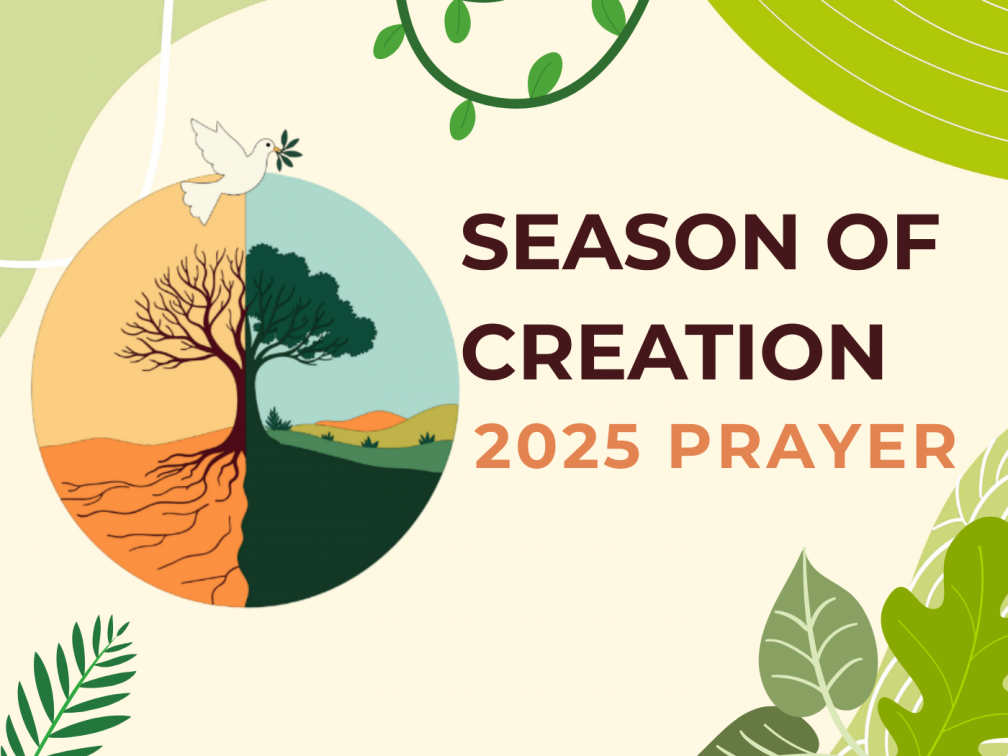One of the world’s most popular new video games is attracting people to gardening…… virtual gardening! ‘Grow a Garden’ involves players slowly developing a little patch of virtual land. They watch virtual seeds grow on their computer screens. Once the garden produces a harvest, items can be sold.
Yet, it is the nurturing of real land, the real biodiversity that relies on it, and real water resources that is truly important in today’s world. The Season of Creation offers an important opportunity for doing that.
The Season of Creation runs from the 1st September (World Day of Prayer for the Care of Creation) to the 4th October (Feast of St. Francis of Assisi). Catholics – and indeed all Christians – are encouraged to organise prayer and practical initiatives to combat the environmental crisis facing our common home. It is a time for our churches to value and thank God for the gifts of Creation.
The theme this year is: ‘Peace with Creation.’ It highlights that natural ecosystems, such as forests and wetlands, are destroyed or degraded by conflict – a mounting problem in our world today. Wars divert political attention and financial resources away from climate action and environmental protection. In many countries, clean energy projects and conservation efforts are delayed or defunded as governments shift priorities toward military spending and crisis management. In the UK, earlier this year, the government increased defence spending, including substantial funds to military projects such as nuclear submarines and warheads, while reducing overseas aid spending, which has been a lifeline to vulnerable communities facing severe weather emergencies.
Also, in this Jubilee Year, a campaign spearheaded by Caritas Internationalis calls for Debt relief and adequate climate finance for low-income countries. Too often, indebted countries have been forced to intensify extraction and export of their natural resources – including fossil fuels – to service debts.
Making peace with nature and protecting biodiversity have been integral to Columban Mission for five decades, especially with the inspiration of the 2015 papal encyclical ‘Laudato Si’. Internationally, Columbans support such projects as a major tree growing project in the Philippines and environmental stewardship work in Pakistan.
In Britain, Columbans are ‘rewilding’ land around our Solihull headquarters. Rewilding aims to restore healthy ecosystems by creating wild, biodiverse spaces, which allow a variety of life to thrive. This is very important in Britain, which is one of the world’s most nature-depleted areas. More than 5,000 trees have been planted and a wildflower garden. The new trees include River Birch, Black Alder, Willow, Swamp Cypress, Sweet Gum and Oak plus fruit trees – Apple, Plum, Pear and Cherry. There are new bee hives, benefitting from the nectar of nearby blossom trees, and already producing ‘St Columban’s Honey’. New lavender beds have been planted to attract bees, which are responsible for a lot more food than honey. In fact, they pollinate 70% of the crops that feed 90% of the world!
School groups have been coming to Solihull for workshops exploring biodiversity and rewilding. At least 800 children and staff have visited this year alone, learning about the life systems in the natural world. And several school groups joined Columbans and 5,000 campaigners on 9 July to lobby at the UK’s Westminster Parliament for action on the climate crisis, biodiversity loss, and global justice. It brought Catholic Social Teaching and care for creation to the heart of government.
The Season of Creation website has a wide variety of resources for individuals, groups and parishes. Materials available include a Catholic Celebration Guide, and suggestions for educational and sustainability activities.
Despite the focus of many Christian services on a Eucharistic meal and celebrating the gifts of creation, too often Christians – along with everyone else – have alienated themselves from the natural world which provides the very air, forests, water, soil – the matrix of agriculture – which we depend upon for life. Let’s grow vegetables and harvest fruit tree produce. Perhaps we could revive saying Grace before family and community meals to recover our appreciation of the food provided by the natural world.


